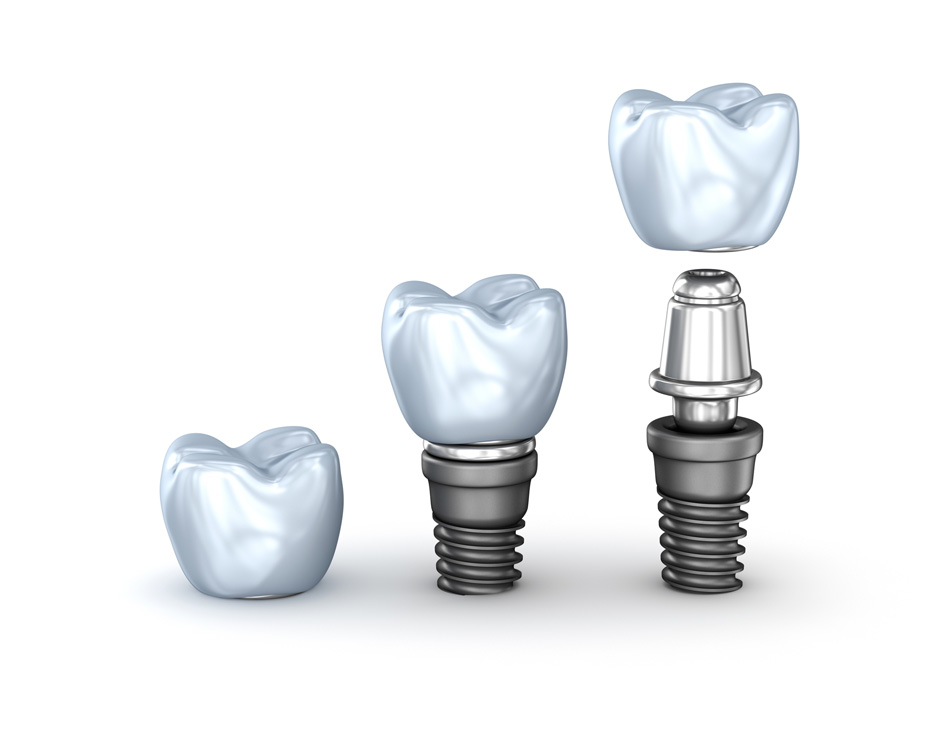Dental Implants in Newcastle and Wickham, Belmont
When you need to replace missing teeth, dental implants are an excellent option to consider. Today’s implant designs allow you to replace a single tooth as well as cases involving multiple teeth or all of your teeth.

Types of Implant-Retained Restorations
Based on your functional needs and the number of teeth that you’re missing, we may recommend the following:
- A single implant with a crown that fills in open spaces where a tooth has been extracted, instead of having to anchor a traditional bridge on the adjacent teeth.
- Two implants with a bridge to fill in larger gaps where multiple missing teeth are a concern.
- Multiple implants with a long bridge that spans the entire arch.
- Fewer implants with a supported denture that’s more comfortable to wear and less bulky than a conventional prosthesis.
Single Dental Implants
For patients missing just one tooth, a single dental implant is often the ideal choice. The titanium implant integrates with the jawbone, creating a stable foundation for a custom-made crown. Unlike traditional bridges, single implants don’t rely on adjacent teeth for support, preserving their natural structure. Once restored, it will look, feel and function like a real tooth—helping you chew, speak, and smile with ease.
Ideal for:
- Replacing a single missing tooth
- Preserving neighbouring teeth
- Long-term stability with natural aesthetics
Implant-Supported Bridges
When two or more teeth are missing in a row, an implant-supported bridge can be an effective and cost-efficient solution. Instead of placing an implant for every missing tooth, two or more implants are used to anchor a bridge, which spans the gap. This option offers more strength than a traditional bridge and eliminates the need to alter healthy teeth.
Ideal for:
- Multiple missing teeth in a row
- Avoiding removable partial dentures
- Providing strong chewing ability
All-on-X Implant Bridges
If you’re missing all or most of your teeth, our All-on-X implant solution may be right for you. This method involves placing 4 to 6 strategically positioned implants per arch to support a full-arch bridge. All-on-X offers a streamlined and stable solution that feels more like natural teeth and typically requires fewer implants than traditional full-arch methods.
Benefits include:
- Fixed (non-removable) full-arch solution
- Improved speech and chewing function
- Immediate smile transformation in some cases
- Reduced healing time compared to individual implants for each tooth
Implant-Supported Dentures
For those seeking a secure, comfortable alternative to traditional dentures, implant-supported dentures offer a stable solution. A few implants support a custom denture, which can be removable or fixed. These dentures ‘snap’ into place or stay fixed, reducing slippage and discomfort while improving bite strength and confidence.
Benefits include:
- Better fit and retention than traditional dentures
- No need for messy adhesives
- Improved bone stimulation, reducing jawbone shrinkage
- Comfortable and natural-feeling
30 MINUTE COMPLIMENTARY CONSULTATION
ON ALL COSMETIC SERVICES
Thinking about ways to improve your smile, but unsure where to start?
Our practice employs a facially driven approach to design your smile, making subtle improvements that enhance your overall appearance.
We also make sure your smile stays healthy and looks great for a long time to come.
VIEW SMILE GALLERY Request A Free Consult
T&C’s apply.

Evaluation
Implants are only recommended in instances where there are good bone quality and a healthy oral environment to support them. For some people to be eligible for treatment, a bone graft may be needed to ensure there is adequate support. After having a CT scan taken, we can proceed with the specific recommendations surrounding the placement method and the number of implants required to make your case a success.

Treatment Process
Getting dental implants is a process that spans several weeks or a few months, due to the time necessary as your body responds and heals between treatments. For instance, we will want to ensure that the implant integrates with your bone and that the soft tissues are shaped appropriately before a permanent crown, bridge or denture is affixed to them. We can provide you with an estimated timeline during your initial evaluation.
Advantages of Getting Dental Implants
Today, implants are the preferred treatment of choice for our patients with missing teeth. Because the integrity and longevity of an implant design allow it to mimic natural teeth more closely than any other type of dental restoration, it’s hugely beneficial in many ways.
Implants are structurally sound and capable of withstanding an extreme amount of force. As such, we’re able to use them in pairs to support multi-tooth restorations like bridges. Plus, their support of bone and gum structures over them minimises the “sunken in” or shallow facial appearances often seen with tooth loss. Being that implants add depth and volume to your bite, they help to fill out your cheeks and lips.
Choosing to invest in dental implants is a decision that will affect your smile for the rest of your life. Only you can decide if the investment is worth it or not.
How Much Do Dental Implants Cost?
Here at 7 Pearls Dental, we only use reputable implants, genuine components and Australian laboratories for all restorations. As each patient has unique needs, a final quote can only be obtained after a comprehensive consultation and assessment of suitability.
Implants can vary in price, which is why we offer a complimentary implant consult.

The Process of Dental Implant Restorations
Single Tooth Replacement
Where there is a single tooth missing, we would use a single dental implant to replace the missing tooth. For this procedure, the titanium dental implant undergoes the process of osseointegration whereby over a period of a few months, the implant will effectively fuse with your jawbone as it heals. This forms a strong and durable tooth root alternative which stimulates the jawbone and gum line to keep them alive and healthy. On top of the dental implant, an abutment is placed, which is then covered with a strong prosthetic tooth, such as a dental crown.
Step 1: Complimentary consultation (30min)
At this appointment, we will review your treatment goals and discuss the process involved in dental implant treatment, providing both the costs and the time estimates. If you have any previous X-rays or 3D-scans they would be helpful at this visit, otherwise they will be required at your next visit. If you know what you need and want, we can skip forward and go straight to Step 2.
Step 2: Implant records appointment (30min)
If you are a suitable dental implant candidate, you will be scheduled for a record-taking appointment, which allows us to plan your treatment from start to finish. The most common records required are a CBCT or Cone beam X-ray (3D Jaw scan), a scan/impression of your teeth and gums. Health fund rebate may apply for the following codes: 026, 071×2, and 678.
Step 3: Final consult and treatment plan (15-30min)
No charge or Health Fund Rebate Only
We then proceed to schedule a final consult where we will go through all of the most pertinent details and factors regarding your specific case and circumstance, and we may be able to present varying options and prices when more than one suitable option exists. By the end of the visit, you will be presented with a fully itemised treatment plan with all costs, including time frames for the treatments proposed. When you are ready to proceed, we will take a $500 deposit and order the necessary surgical equipment for your case.
Step 4: Implant surgery (60-120min)
This appointment is unique to each case and can range from 60-120min depending on the complexity of your case.
Step 5: Implant restoration (30-45min x2 visits)
Your final restoration is usually delivered around 3-4 months after your initial surgery. If you require a temporary restoration until this time, many options exist and will be discussed with you in your planning appointment.
Step 6: After care
A well-placed and restored dental implant should provide years, and ideally decades, of function. However, it is important to maintain excellent oral hygiene and have regular dental checkup and hygiene appointments, not just to monitor and maintain your dental implant, but your whole mouth. This way, if any issues arise, we can address them promptly and prevent them from becoming more serious problems.
Costs
Surgery
Typical health fund codes: 026, 684
Healing abutment placement
Typical health fund codes: 691
Restoration with a porcelain tooth 3-4 months later
Typical Health fund codes: 661, 673, 531
Temporary Teeth
- Bonded to adjacent teeth (not removable)
- Immediate temporary, attached to implant (not suitable for all cases)
Grafting
Unfortunately, we commonly encounter implant sites that are deficient in soft tissue (gum) and/or hard tissue (bone) volume. In these cases, additional augmentation procedures are either essential for implant treatment or beneficial for treatment. At your consultation, any specific extra requirements or optional extra treatments will be discussed. In some cases, grafts can be avoided but may result in a less aesthetic outcome.
Soft tissue grafts to repair deficient gums:
- Health fund codes: 234, 236, 243
Hard tissue grafting or GBR (Guided Bone Regeneration) to repair minor deficiencies in bone volume
- Health fund codes: 234, 236, 243
REQUEST A
COMPLIMENTARY
CONSULTATION
Discover if implants are the right choice for your smile. We offer a 30-minute consultation to determine if you qualify for this state-of-the-art treatment. Contact us today to get started!

